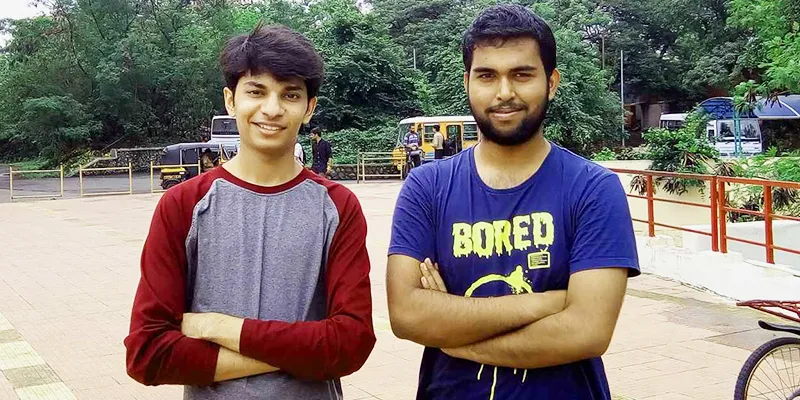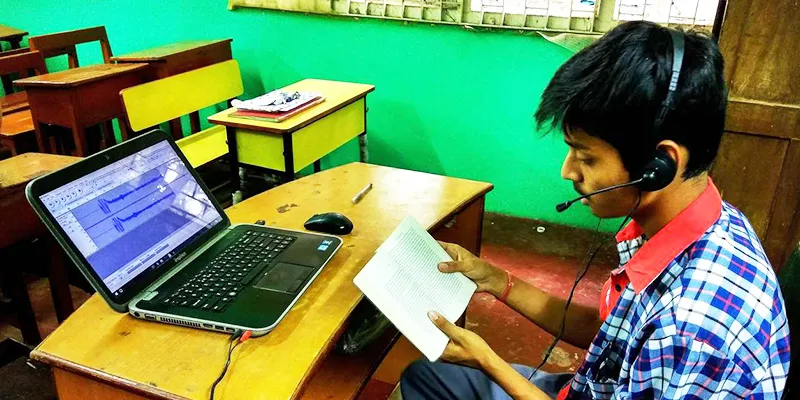Project Awaaz takes the joy and power of reading to the visually-impaired
This announcement is sponsored by Tissot
“Whenever you read a good book, somewhere in the world a door opens to allow in more light.” - Vera Nazarian
It’s noon at the Kamla Mehta School in Dadar, Mumbai. A 100 students appear engrossed at their computers. The room is uncharacteristically quiet, save for the young voice emanating from the speakers, filling the room with words from Rilke’s poem ‘A Walk’. The children listen intently. Step in and you’re transfixed by the poignancy of the moment.
These children are visually impaired, and are listening to poetry read to them by the volunteers of Project Awaaz – a social venture co-founded in June 2016 by four engineering students of IIT-Bombay – Rishabh Bohara, Ishan Rakshit, Nihal Singh, Arpan Banerjee and Arunabh Saxena. Project Awaaz creates audiobooks for visually impaired students, crowdsourcing content from its volunteers across the country.

India is home to 15 million visually impaired people or 41 percent of the world’s visually impaired population. Of this, 15 percent are children for whom access to quality education is still a dream. “It is a challenge for them to even access good quality content, especially in regional languages, and only 1 percent of all published books are available as audiobooks,” Bohara tells me.
On a visit to the National Association for the Blind in Delhi, Bohara met volunteers who dedicated their time to recording content for the visually impaired. “This community-based system of content creation was the inspiration for Project Awaaz,” he reminisces, “and it got us to think about how technology can be used to create a scalable process of getting good quality content from the community to the blind.”
Reading the world and reading the word
Project Awaaz makes it easy for anyone, anywhere in the world to record content and upload it to the website, all from the comfort of their homes. Volunteers can create an account, log in, pick a title in a language they are comfortable reading in, follow the instructions on how to achieve a high-quality recording, and once done, submit it to Project Awaaz. The website supports content in English, Gujarati, Hindi, Marathi, and Tamil. Currently, to get people accustomed to the idea of recording their voices online, the website offers a list of short form content, mostly poems and short stories that people can read quickly in one sitting, but they also allow the recording of original content. Once the raw audio is processed to remove background noise, various readings are compiled, and handed over to schools. “While it may not be as fine as content produced in a sophisticated recording room, the quality of the audio is very good,” Bohara says.

Through its partnerships with schools and organisations working with the visually-impaired, content uploaded to the Project Awaaz website reaches over 800 children aged 10-17. Over a 100 volunteers have recorded content through the website.
Bohara draws my attention to the severe dearth of vernacular content for the visually impaired in India where technologies for text-to-speech conversion are not as well-developed as they are for English. “We see people easily recording content in English and Hindi on Project Awaaz. Our main focus now is to create superior quality content in other regional languages and make it as accessible as possible.” The Project is sourcing license-free vernacular content from platforms like Pratham Books’ Storyweaver for its volunteers to record.
To complement its online activity, Project Awaaz takes its #LendYourVoice programme to schools, colleges, and offices where a large volume of content can be recorded at once. Says Bohara, “When children record content for other less-privileged children, they become more aware of and sensitive to the issues faced by them.”
Its volunteers at IIT-Bombay have begun recording the Harry Potter and Famous Five series and plan to take on academic content soon. “Finding volunteers who will record regularly and consistently is a challenge, especially while creating time-bound curricular content,” he admits. As a way to increase stickiness, the team plans to send impact reports to volunteers informing them of the reach and impact of their efforts, and of what more they can do to help. Bohara sees school and college-based Project Awaaz clubs as a sustainable way to take the initiative forward with more, regular content-recording sessions.
However, he is also quick to add that Project Awaaz has received an encouraging response from volunteers across the country and abroad whose feedback helps improve the platform and connect better with the community.
The young team behind this initiative may be juggling college, internships, projects, and placements, but they have many plans up their sleeve to bridge the content gap. They hope to be able to support more vernacular languages and expand the content base. They are also increasing the number of offline recording sessions, adding to their volunteer base, and building an online repository of content for easy access by schools.
“Becoming the part of Tissot Signature Innovators’ Club makes us really happy for two reasons…,” Bohara says. “When the work we do is recognised and appreciated by others, it drives us to push even harder. But, more importantly, it helps us reach out to many more people and get more stakeholders involved. This way, we add on more volunteers, receive feedback to improve our features, and ultimately, spread out to reach more children across India in many more local languages.”







